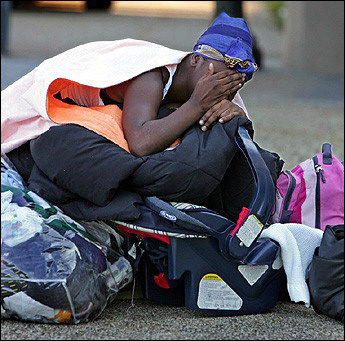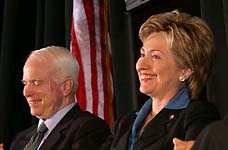
FEMA employees and Crisis Corps volunteers are not first-responders, like fire fighters and Red Cross volunteers often are. We are not even second-responders like insurance companies are. Yet, FEMA is the unifier of most responses to declared disasters. In our rural area, folks are friendly. Lunches are sent to us by the local school cafeteria. We obviously do not accept gifts, but one grateful resident brought a cake to our DRC.
Ukraine RPCV Chandler Harrison Stevens writes about RPCVs working in Crisis Corps in Hurricane Relief (Part 2)
KATRINA/RITA VICTIMS by Chandler Harrison Stevens (10/1/2005)
Four of us -- Bob, Priscilla, Walt & I, from our 11-person Crisis Corps subgroup9a of Peace Corps Katrina or USA1 (I had been in Ukraine14 in 1999-2001) -- arrived midday in Mobile, Alabama on Sep 19th to help in two Disaster Response Centers (DRCs). Walt & Priscilla each rented cars, for which Peace Corps will reimburse them. Our lodging and subsistence money (for meals, etc.) had already been deposited in our banks.
Using ATM cards and direct-deposits to personal bank accounts is also occurring for Expedited Assistance (EA) of $2,000 each, when provided by FEMA for those disaster victims evacuated from hurricane damaged homes. One EA check, which I later tracked down for a FEMA applicant, was mailed to an Alabama temporary address for this evacuee from Louisiana, just a few days after Rita hit their Lake Charles home. Another Lake Charles evacuee, holding a three week old baby that was born after Katrina, was referred to the American Red Cross for temporary Rita housing and had just as quickly been approved for $2,000 in expedited assistance. One Katrina victim returned a $2,000 check, because the name on the check was much different than hers, due an error made when she applied to FEMA for help nearly a month ago. Hindsight suggests she should have used her name to endorse the check after explaining the error on the check. She may not receive that reissued $2,000 check for awhile. Most evacuees got immediate cash.
Before we worked on such matters with FEMA applicants, we four drove on September 19th to an ABBA Shriners facility where we could have stayed on cots. My cousins put a couple of us up that first night before we drove north a couple of hours to DRC#2 in Chatom to work and to a motel 40 minutes east in Jackson, Alabama. We saw blue tarps on damaged roofs. Many tarps probably came from the joint state & FEMA building, a former American Legion hall, our DRC, where I am writing this journal. When we were interviewing nearly 150 applicants daily, there was no time for writing or even for email.
Thinking our training had ended in Orlando, we were still glad to learn much more by observing and assisting Harold, Marge & Randy last week, before Priscilla & I then interviewed about 40 applicants each this week. I have helped folks to apply for reimbursements for chainsaws or generators bought following Katrina, to apply for housing repair reimbursements, and to refer some applicants for crisis counseling, disaster unemployment compensation, aid to aged applicants, HUD urban housing, DOA rural housing, IRS tax 2004 refunds to offset 2005 hurricane losses, free legal help on matters not likely to entail a percentage-of-settlement fee, Red Cross, shelters provided sometimes by churches, and/or the Small Business Administration (SBA), which has two representatives in our DRC. Non-business people are usually surprised to learn that SBA makes loans to households as well as to businesses. As a matter of fact, as an Applicant Services Specialist (we NEVER use the acronym for that title), I must refer to SBA any FEMA applicant who makes over $12,000, if having no dependents, or over $24,000, if in a 4-person household. I don't ask their income levels, but when they applied via http://www.fema.gov or 800-621-FEMA, they were asked. On the computer screen I look at when they come see me, I can see by a FIT (Failed Income Test) code if the FEMA computer system automatically found that they could not likely pay back an SBA loan.
SBA can loan more money than FEMA can grant for the more expensive home repairs. I never predict whether FEMA will pay anything or not. My job is merely to help folks apply for anything for which they might be eligible. If their damaged home is insured, I urge them to get a settlement letter as soon as possible from their insurance company.
Computer systems make sure that aid is not duplicated. Contracted FEMA inspectors go look at damages to determine what FEMA might pay toward repairs. If an applicant wants to appeal an inspector's decision, I suggest they get a repair estimate on a licensed contractor's letterhead and then fax that with their appeal letter to their nearest FEMA National Processing Services Center (NPSC). Until our DRC closes next Friday, Oct. 7th, we can fax those items for applicants. Still more often, we fax generator &/or chainsaw receipts, although FEMA pays amounts of $796.45 and $216.08, respectively, for those items, when bought during power outages or within 30 days of the hurricane, respectively and subject sometimes to appropriate inspections. It would not be easy for fraud to occur, given the careful checking that is built into FEMA processes & systems.
FEMA employees and Crisis Corps volunteers are not first-responders, like fire fighters and Red Cross volunteers often are. We are not even second-responders like insurance companies are. Yet, FEMA is the unifier of most responses to declared disasters. In our rural area, folks are friendly. Lunches are sent to us by the local school cafeteria. We obviously do not accept gifts, but one grateful resident brought a cake to our DRC.
In Alabama, about $100 million has gone to 100,000 Katrina victims, which would average out to $1,000 per household. Some applicants receive nothing, and there are upper limits of 4 to 5 figures on what FEMA can pay, which is why loans and grants from other sources could be important. Most $2,000 expedited payments went to evacuees from Louisiana. The ones I saw have nearby families here in rural Alabama. I'm told that I'm currently in the poorest county in Alabama. The people here are nice.
Since my Independent state legislator days in Massachusetts in the mid-1960s, I have been advocating a negative income tax or flat-subsidy+flat-tax as a radical middle way to combine the anti-bureaucratic attitude of old-line conservatives with the humanitarian commitment of old-line liberals. I see that idea as becoming more practical now that electronic funds transfer (EFT), automatic teller machines (ATM), debit cards, and funny money -- in the form of vouchers, food stamps, etc. -- have become more prevalent. Suppose everyone received a flat subsidy of $10/day/person, and all were taxed at 30% on all income, including subsidies. Then a family of four earning $34,067/year would break even. Work incentives would be preserved, since for every additional dollar earned, seventy cents would be retained after taxes. For the elderly, the handicapped, and disaster victims, the flat subsidy could be increased. For those at the low end of earning capacities and/or having special needs, subsidies could be not in the form of unrestricted dollars but could be limited "funny" money that could be only spent on particular needs, such as food, housing, repairs, clothing, counseling, retraining or whatever might get coded into special debit cards, more advanced than those issued to hurricane evacuees.
We're making progress! I leave for home on October 14. I'll have more to report then.














